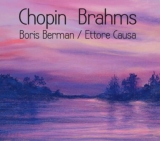Der Bratschist Ettore Causa und der Pianist Boris Berman haben die zwei Sonaten von Frédéric Chopin und Johannes Brahms, die eine im Original für Cello, die andere für Violine, selber transkribiert. Im Textheft setzen sie sich in einem Essay mit dem Für und Wider solcher Transkriptionen auseinander.
Während das Klavier in beiden Sonaten den quasi unveränderten originalen Part spielt, waren naturgemäß fürs Ersetzen des Cellos bei Chopin und der Violine im Falle von Brahms Änderungen notwendig. Das haben beide Werke aber, wie zu hören ist, schadlos überstanden. Ich muss sogar zugeben, dass mit die Chopin-Sonate mit der heller timbrierten Bratsche ebenso gut gefällt wie die originale Fassung.
Ettore Causa entwickelt einen sehr schönen Dialog mit seinem ausgezeichneten Partner Boris Berman. Romantische Aufschwünge, spontane Ausbrüche und viel Intimität: Beide Musiker verstehen es hervorragend, Atmosphären und Klangfarben zu entwickeln. Das Finale spielen sie besonders schwung- und kraftvoll.
Die Violinsonaten von Johannes Brahms sind Spätwerke, Werke eines reifen Meisters. Die Sonate op. 78 schrieb Brahms im Sommer 1878 und 1879 in Pörtschach am Wörther See, wo auch die pastorale Zweite Symphonie entstand, mit der diese Sonate verwandt ist. Der erste Satz ist sehr lyrisch. Auf ihn folgt ein stimmungsvolles Adagio, ehe der 3. Satz, ein Allegro molto moderato das Werke beendet.
In der Version für Bratsche und Klavier begegnen wir einem schwärmerischen Brahms. Berman und Causa halten die Musik gut in Bewegung, mit einem bei beiden gleich ausgeprägten Sinn für Kantabilität, gelingt es ihnen die sehr diskret bleibende Gefühlswelt von Brahms unaufdringlich zu verdeutlichen.
Violist Ettore Causa and pianist Boris Berman have transcribed two sonatas by Frédéric Chopin and Johannes Brahms, one originally for cello, the other for violin. In the booklet, they discuss the pros and cons of such transcriptions in an essay.
While the piano plays the virtually unchanged original part in both sonatas, changes were obviously necessary to replace the cello in the case of Chopin and the violin in the case of Brahms. However, as you can hear, both works survived this without any damage. I must even admit that I really like the Chopin sonata with the brighter timbre of the viola as much as the original version.
Ettore Causa develops a very beautiful dialogue with his excellent partner Boris Berman. Romantic outbursts, spontaneous outbursts and a lot of intimacy: both musicians are excellent at developing atmospheres and timbres. They play the finale with particular verve and power.
The violin sonatas of Johannes Brahms are late works, works of a mature master. Brahms wrote the Sonata op. 78 in the summer of 1878 and 1879 in Pörtschach on Wörthersee, where he also composed the pastoral Second Symphony, to which this Sonata is related. The first movement is lyrical. It is followed by an atmospheric Adagio before the third movement, an Allegro molto moderato, brings the work to a close.
In the version for viola and piano, we encounter a rhapsodizing Brahms. Berman and Causa play fluidly and with a good sense of the cantabile, they succeed in unobtrusively clarifying Brahms’s very discreet emotional world.
























